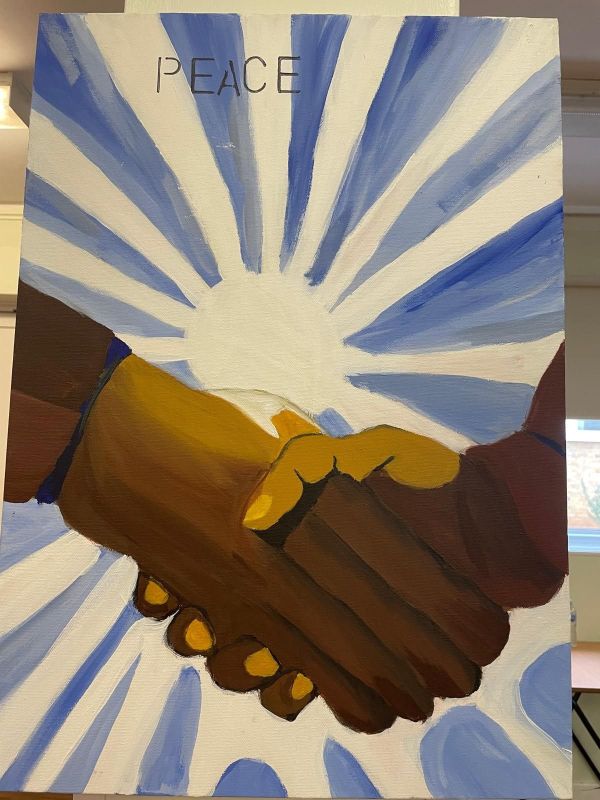Our School
Peace

Work by Julia Pytel
There is neither Jew nor Greek, there is neither slave nor free, there is no male and female, for you are all one in Christ Jesus. Galatian 3:28
At St Joseph’s we show solidarity in all we do. We stand side-by-side with our sisters and brothers, especially those living in poverty. Solidarity begins with the idea that all of us, created in the image and likeness of God, are part of one family. In the Catechism of the Catholic Church we are reminded that; “The Eucharist commits us to the poor. To receive in truth the Body and Blood of Christ given up for us, we must recognize Christ in the poorest, his brethren.”
It is clear in the Gospel that loving your neighbour, especially the ‘least of your brethren’ becomes an act of solidarity towards God. Solidarity is an act of love. Just as there is solidarity between individuals we also aim for solidarity between and within institutions and nations
In practice, signs that show our solidarity with others are the way we love and serve each other, by the way we are involved in social issues like the treatment of refugees and the homeless, by the way we show respect for, and engage in dialogue with, those from other cultures, races, religions
In our world today over 1.3 billion people live below the agreed UN poverty line, Pope Francis reminds us that “The many situations of inequality, poverty and injustice, are signs not only of a profound lack of fraternity, but also of the absence of a culture of solidarity”
Where is it seen at St Joseph’s?
The Catholic Social Teaching principle of peace is emphasized across various subjects, focusing on promoting harmony, justice, and non-violence. In R.E., students study Christian moral actions, particularly Dietrich Bonhoeffer’s teachings, which stress peace as a central aspect of Christian discipleship, and examine the church’s role in advocating peace, especially in conflict situations. Year 11 explores the Church’s teachings on peace, looking at how biblical perspectives guide Christians toward peacebuilding. History lessons on major wars, the Cold War, and the Civil Rights Movement highlight the importance of peace in overcoming conflict and injustice. Geography teaches students about global governance, the United Nations, and the need for peace in promoting global stability. In French and Spanish, students discuss peace, community projects, and immigration, fostering understanding and harmony across cultures. PSHE covers topics like hate speech, climate change, and cultural appropriation, urging students to promote peaceful solutions to societal issues. P.E. emphasizes peace through teamwork and collaboration in sports, teaching students the value of working together peacefully to achieve common goals. In Drama, students learn to collaborate, building mutual respect and peace in their performances. Music and Art explore themes of peace and social change, while Law and Sociology examine the role of justice in sustaining peace. Overall, these subjects provide students with the tools to embody and promote peace in their daily lives.
In our pastoral system peace is very important in our relationships with one another and we all actively seek to resolve conflict between peers to ensure all can come together to celebrate our school community.

